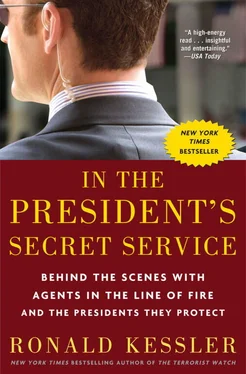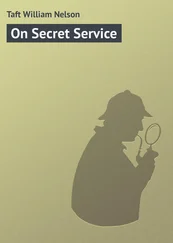“We were looking around, and we didn’t see anybody,” Chomicki says. “There was a coffee-to-go truck sitting nearby. We went up and asked the guy, ‘Did you see anybody on the phone a short while ago?’”
“Yeah, about quarter to eight there was a guy,” the man said.
He gave the man’s estimated height and weight and described him as wearing blue pants and a blue shirt. The time cited by the coffee man coincided with the call Chomicki had received at the field office. Chomicki asked the coffee man why he had noticed the individual using the public pay phone.
“Usually I show up on the corner at eight,” the man explained. “I just happened to get here early today, and my customers don’t expect me here until eight, so business was slow. I was just sitting here staring at the phone booth and saw this guy on the phone, and I just happened to remember what he looked like.”
The agents jumped into their cars. Chomicki drove east on New York Avenue; the other agent drove west. Just then, Chomicki spotted a man who matched the description given to him by the coffee man. He was using a pay phone on the outer wall of the bus terminal building.
Chomicki made a U-turn and parked his car across the street. He walked up behind the man and heard him talking in a Midwestern accent. It was the voice of the man who had called him at the field office.
“I grabbed him by the scruff of his neck, and I pushed him between the phone and the side panel, and I grabbed the phone,” Chomicki says.
“This is agent Chomicki of the Secret Service,” he said into the receiver. “To whom am I speaking?”
“Wow! How’d you get him?” a voice on the other end of the line said. It was another agent back at the field office. He said the man had just called, threatening to kill Reagan.
The suspect claimed he was just trying to call a taxi. As he tried to get away, Chomicki dragged him to his car, placed him against the trunk, and handcuffed him. After he was given a psychiatric examination, a judge committed him to a mental institution.
Secret Service agents often deal with what is called White House–itis, a malady of arrogance that grips some White House aides. Near the end of Reagan’s term, that affliction almost got one of his aides shot. Agent Glenn Smith was guarding Reagan at the Waldorf-Astoria in New York for the U.N. General Assembly. Smith heard a man shout, “Stop or I’ll shoot!” Smith took out his .357 Smith & Wesson Magnum and placed his finger on the trigger. Just then, a man came bolting through a door with a New York City police officer in hot pursuit.
The man turned out to be a White House staffer who was so full of himself that when a Secret Service agent asked him to identify himself at an inner checkpoint, he refused. When the agent tried to block his way, he pushed the agent away. The police officer then chased after him.
“If I had gotten a clear shot at the man, I would have shot him,” Smith says.
As with all presidents, some people totally lost it when meeting Reagan. One woman in a crowd threw her baby into the air. Agent Glenn Smith had to catch the little girl. An eighty-year-old woman held on to Reagan’s hand so tightly that Smith had to pry it loose. Hoping to get an autograph, a sheriff approached Air Force One at high speed in his cruiser with lights flashing. The sheriff brought his car to a halt just in time.
“In a few more seconds, we would have opened fire on the car,” Smith says.
While in office, Reagan never showed the effects of Alzheimer’s disease, which ultimately led to his death. “We had a hundred twenty agents on his detail, and he seemed to remember everyone’s name,” Smith says.
But in March 1993, a year before he announced that he was suffering from Alzheimer’s, former president Reagan honored Canadian prime minister Brian Mulroney at his library and invited him to his ranch. As Mulroney was leaving, the prime minister asked Agent Chomicki, “Do you notice something with the president?”
Chomicki said he did but did not know what the problem was.
“He would just stop midsentence and forget what he was saying,” Chomicki recalls. “Then he would just start a whole new story.”
After Reagan had been out of office for three years, he was to speak at an event in Akron, Ohio. In contrast to the retinue he’d had as president, Reagan traveled with just one staffer and his Secret Service contingent. The agent in charge of the former president’s protective detail came into the command post and said to agent Dowling, “You know, the president’s been sitting in his room alone all morning. And he’d really like for some folks to talk to. Would you guys mind if he came over and sat in the command post and just chatted with you guys for a while?”
“That’d be terrific. Bring him over,” Dowling said.
For two hours, Reagan chatted with the agents, telling stories and jokes.
“He told us he and Mikhail Gorbachev had private conversations,” Dowling says. “They agreed that their talks were not about today and are not about us. They’re about our grandchildren and the life that they’re going to live.”
16

The Big Show
TO SIGN UP to take a bullet for the president requires extraordinary commitment. Besides the glamour and the travel, “I see being in the Secret Service as a calling for me to serve my country and do good at a higher level,” one agent says.
“Agents do not protect any individual but rather the integrity of the office, so the bullet we may take is for the office—not the person,” another agent says.
The job requires not only protecting the president but safeguarding the lives of other agents.
“When I walked into an event with the president as part of the protective detail, I knew and trusted that everybody would do their job,” former agent Norm Jarvis says. “The formation has shift agents, and each has responsibilities unique to each position. So if everybody takes care of their position, then you don’t have to worry about your back, or who’s looking out over your shoulder. Somebody is. You just have to focus on what your job is at the time. Agents build up an awful lot of trust and appreciation for each other.”
The reverse is true as well.
“If you detect that somebody’s lazy or not thorough or not doing the job, it means more than just ‘Hey, this guy’s a bum and I’ve got to spend my time with him,’” Jarvis says. “You feel like your life could possibly be in danger. Certainly the president’s life would be in danger. So there’s a lot of us within the detail policing ourselves and using positive and negative sanctions to get people to do the right thing all the time.”
Agents recognize that the job entails long hours and extensive travel. In describing job opportunities, the Secret Service’s website makes a point of that.
“Agents have a certain drive,” a Secret Service agent says. “They’re all kind of wired the same; they all want to see the job get done, and they want to get it done the right way.”
But many say that the agency’s management needlessly makes the job tougher. In particular, the Secret Service’s senseless transfer policies drive agents to quit before retirement, adding to the government’s costs. This comes at a time when, because of threats from terrorists, the need for the Secret Service has never been greater.
Agents cite numerous situations where fellow agents are denied transfers to cities where their spouses work, while others are forced to transfer to those same cities. Often, the agents who want to transfer have offered to pay their own moving costs. Instead, the Secret Service pays fifty thousand to one hundred thousand dollars each to move agents who do not want to be transferred to those cities.
Читать дальше













